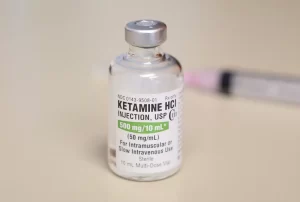
On October 28, 2023, Matthew Perry’s final moments were marked by a troubling request: “Shoot me up with a big one.” This last plea, directed at his personal assistant, led to a fatal dose of ketamine, a drug initially used as an anesthetic and now increasingly popular for its off-label use in treating mental health issues. Perry’s third ketamine injection that day proved to be lethal. He was discovered face down in his backyard jacuzzi, and medics pronounced him dead at the scene. Subsequent investigations revealed that ketamine was the primary cause of death.
Court documents that followed a police investigation into Perry’s death shed light on a disturbing network within Hollywood. The investigation revealed the extent of Perry’s struggle with addiction and highlighted a broader issue: the unchecked proliferation of ketamine, facilitated by both medical and illicit sources.
Ketamine’s rise in popularity has been fueled by its expanded use in treating depression and anxiety, but experts have noted a troubling trend. The drug’s increasing availability through legitimate and underground channels has created a “wild west” of ketamine distribution. Dr. David Mahjoubi, president of the American Board of Ketamine Physicians, explained the ease with which celebrities and others can access ketamine, sometimes leading to dangerous practices.

Federal authorities uncovered a significant underground network distributing large quantities of ketamine across Los Angeles. Perry’s transition from legitimate ketamine therapy for his mental health issues to a dangerous addiction involving street dealers and unscrupulous doctors was documented in court papers. The actor had openly struggled with addiction, a challenge he detailed in his memoir Friends, Lovers, and the Big Terrible Thing. Although he had reportedly achieved sobriety, his return to ketamine therapy marked a downward spiral into dependency.
In the months leading up to his death, Perry reportedly purchased numerous vials of ketamine, spending thousands of dollars. His personal assistant administered frequent injections, culminating in the dose that caused Perry’s death. The probe resulted in five arrests:
- Kenneth Iwamasa, Perry’s personal assistant, who pleaded guilty to conspiracy to distribute ketamine causing death. He admitted to helping Perry obtain and administer the drug.
- Dr. Salvador Plasencia, a physician accused of supplying and administering ketamine, who has pleaded not guilty.
- Dr. Mark Chavez, another physician who confessed to distributing ketamine to Plasencia, has pleaded guilty to conspiracy charges.
- Jasveen Sangha, an alleged street dealer known as the “Ketamine Queen,” is accused of supplying the fatal dose of ketamine and has pleaded not guilty.
- Eric Fleming, a middleman who distributed drugs from Sangha to Perry, also pleaded guilty to conspiracy and distribution charges.
The case underscores a troubling dynamic in the celebrity world, where doctors and medical professionals may fail to uphold ethical standards. Dr. Gerard Sanacora of Yale University pointed out that VIP patients often receive less rigorous treatment, driven by a mix of personal and professional pressures. Similarly, Dr. Mahjoubi described instances where celebrities demand excessive favors, leading to problematic practices.
The unchecked expansion of ketamine therapy has been likened to the early stages of the opioid epidemic. A surge in online ketamine clinics and questionable prescription practices have exacerbated the issue. Despite the FDA’s approval of ketamine for use in specific cases under close supervision, many online services exploit regulatory loopholes to market the drug more broadly.

The rise in ketamine use during the pandemic and the proliferation of online treatment services have further complicated the situation. Critics argue that some companies prioritize financial gain over effective treatment, contributing to a chaotic and dangerous environment.
Dr. Sanacora acknowledged ketamine’s potential benefits for treatment-resistant depression but cautioned that much remains unknown about its long-term effects and risks. The DEA has begun targeting over-prescribing practices, drawing parallels to the opioid crisis and highlighting the need for more stringent oversight.
The tragic death of Matthew Perry has revealed a dark side of Hollywood’s drug culture and the urgent need for reform in the prescription and distribution of ketamine. As the situation unfolds, the focus remains on preventing further tragedies and addressing the systemic issues that allowed such a crisis to develop.





